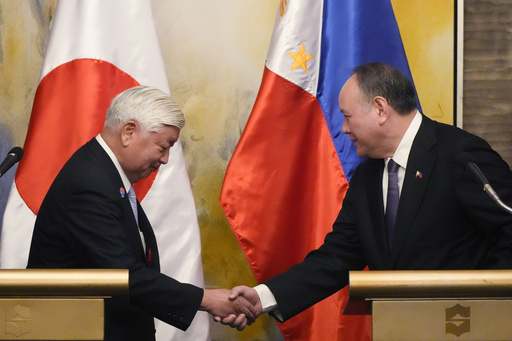In Manila, Philippines, on Monday, Japan and the Philippines reached a new consensus to enhance their defense cooperation and engage in talks focused on safeguarding shared military intelligence, driven by shared concerns over China’s increasingly assertive actions in the region.
During a meeting, Japanese Defense Minister Gen Nakatani and his counterpart from the Philippines, Gilberto Teodoro, prioritized addressing their mutual apprehensions regarding China’s maneuvers in the contentious territories of the South China Sea and the East China Sea.
Both nations, along with the United States, are treaty allies and have actively voiced their critiques against China’s assertive stance in these waters. In opening remarks, Teodoro expressed the Philippines’ eagerness to strengthen defense ties with Japan “in response to unilateral moves by China and other nations that aim to alter the international order and its narrative.”
Following the meeting, Nakatani affirmed their commitment to enhancing operational cooperation, which would encompass joint and multinational defense training exercises, port visits, and the exchange of information. “We also agreed to initiate discussions between our defense authorities on implementing a military information protection mechanism,” added Nakatani.
Last year, the Philippines formalized its commitment with the United States—its longstanding ally—by signing an agreement to better secure the exchange of sensitive military information and technology pertaining to defense systems. This agreement facilitated the U.S. to supply military hardware to the Philippines and was sealed by then-Defense Secretary Lloyd Austin and Teodoro. It came at a time when both countries were amplifying their military collaboration, including large-scale joint exercises, mainly as a response to China’s growing assertiveness in Asia.
Nakatani pointed out that both he and Teodoro recognized the escalating severity of the security landscape and deemed it essential as strategic partners to bolster defense cooperation to uphold peace and stability across the Indo-Pacific region.
Japan has been embroiled in a protracted territorial dispute with China over various islands in the East China Sea. Additionally, in recent years, clashes between Chinese and Philippine maritime vessels have grown more hostile in the South China Sea.
An agreement regarding the “expansion of bilateral cooperation,” particularly relating to the Reciprocal Access Agreement, was also a significant point of discussion. This agreement, finalized last year, permits the joint deployment of Japanese and Philippine forces for military exercises within each other’s territories. Following ratification by the Philippine Senate, the next step involves approval from Japan’s legislature for the agreement to come into effect.
This agreement, which includes live-fire training exercises, is notable as it represents Japan’s first such pact with a neighboring Asian country. Similar agreements have been established with Australia in 2022 and Britain in 2023.
Japan is actively enhancing its security posture and military capabilities, including developing a counterstrike capacity that contrasts with its postwar policy of focusing solely on self-defense. Plans are in place to double defense spending over five years leading to 2027 to strengthen military capabilities.
The history of Japanese aggression in Asia during World War II remains a sensitive topic for many neighboring nations, including the Philippines; however, the push to deepen military ties between Japan and the Philippines continues, largely motivated by concerns over China’s actions in the region.


